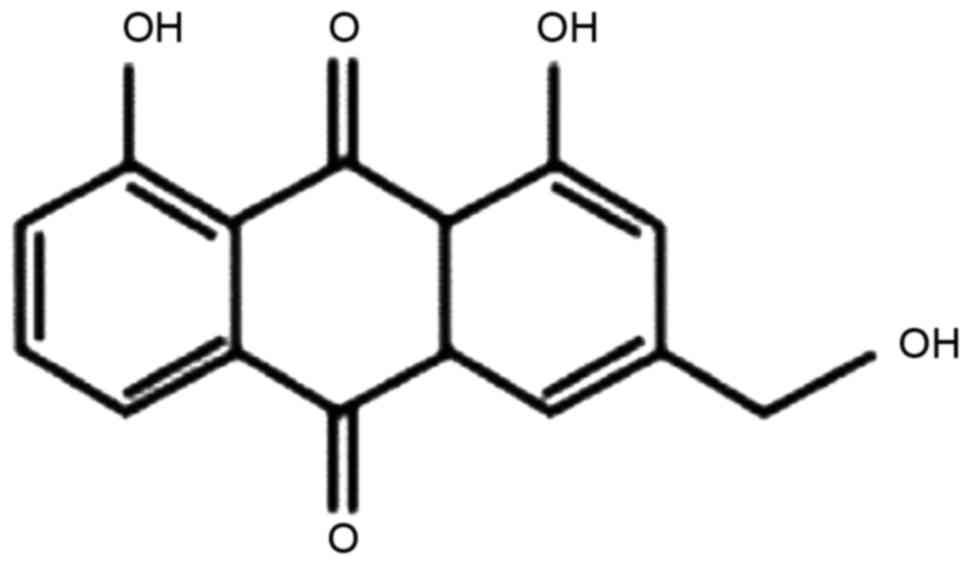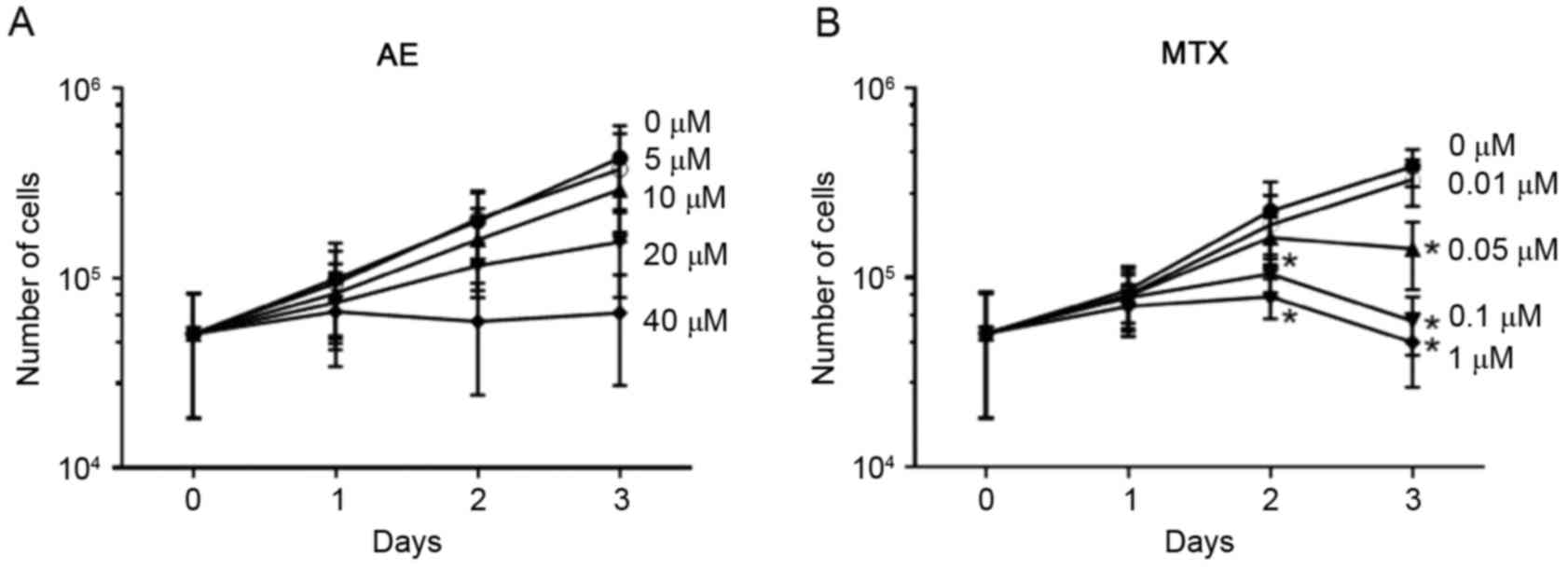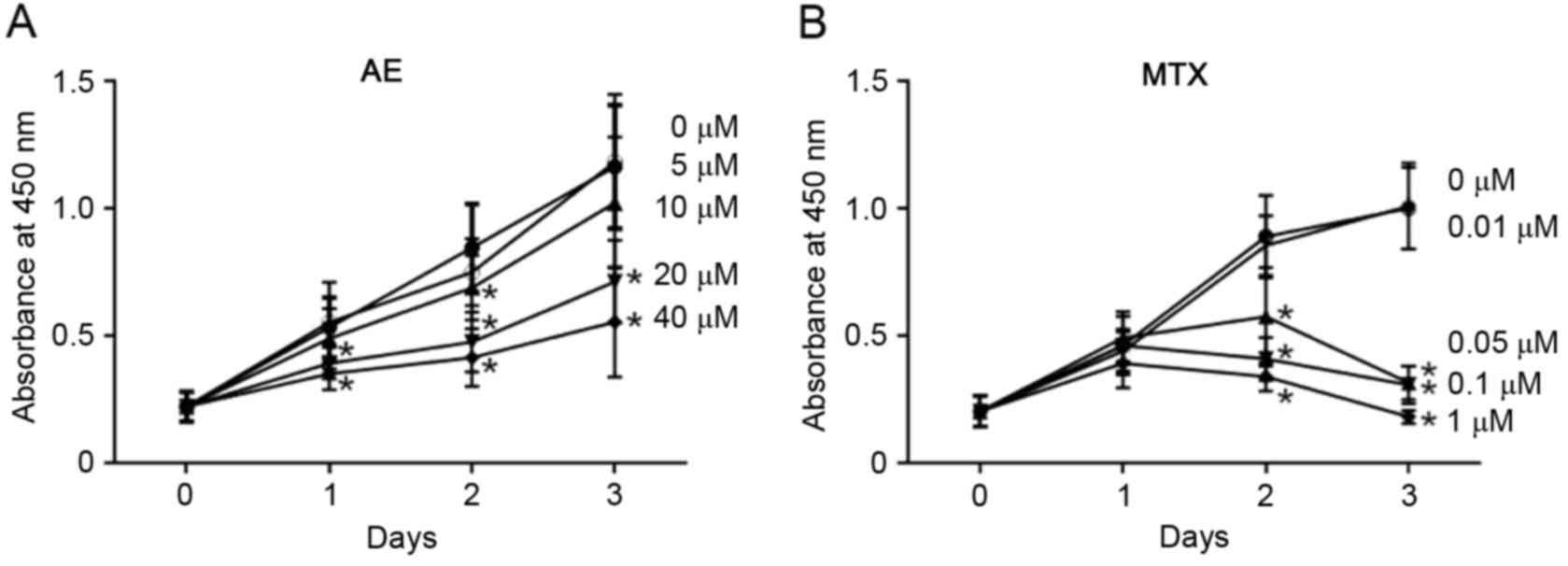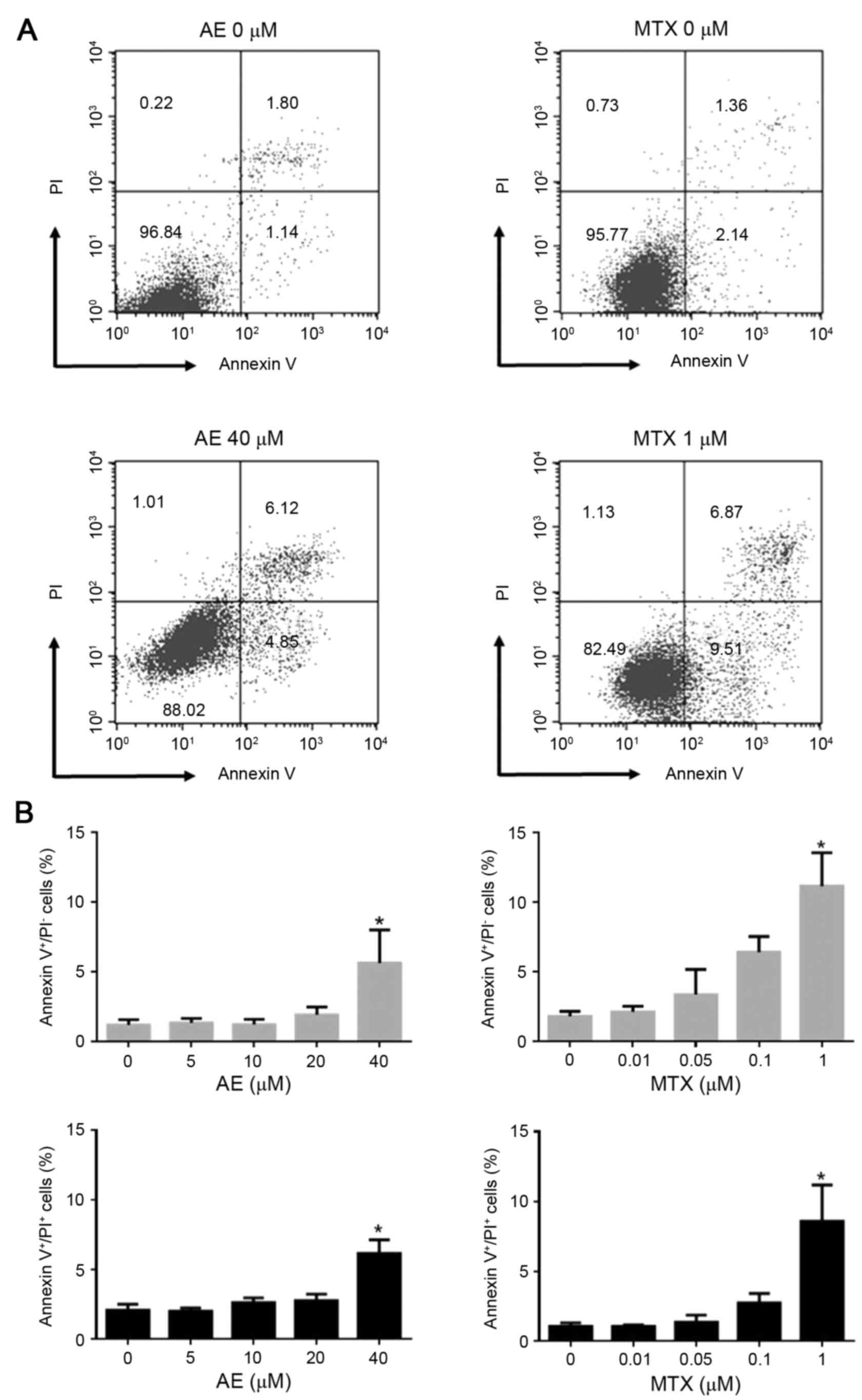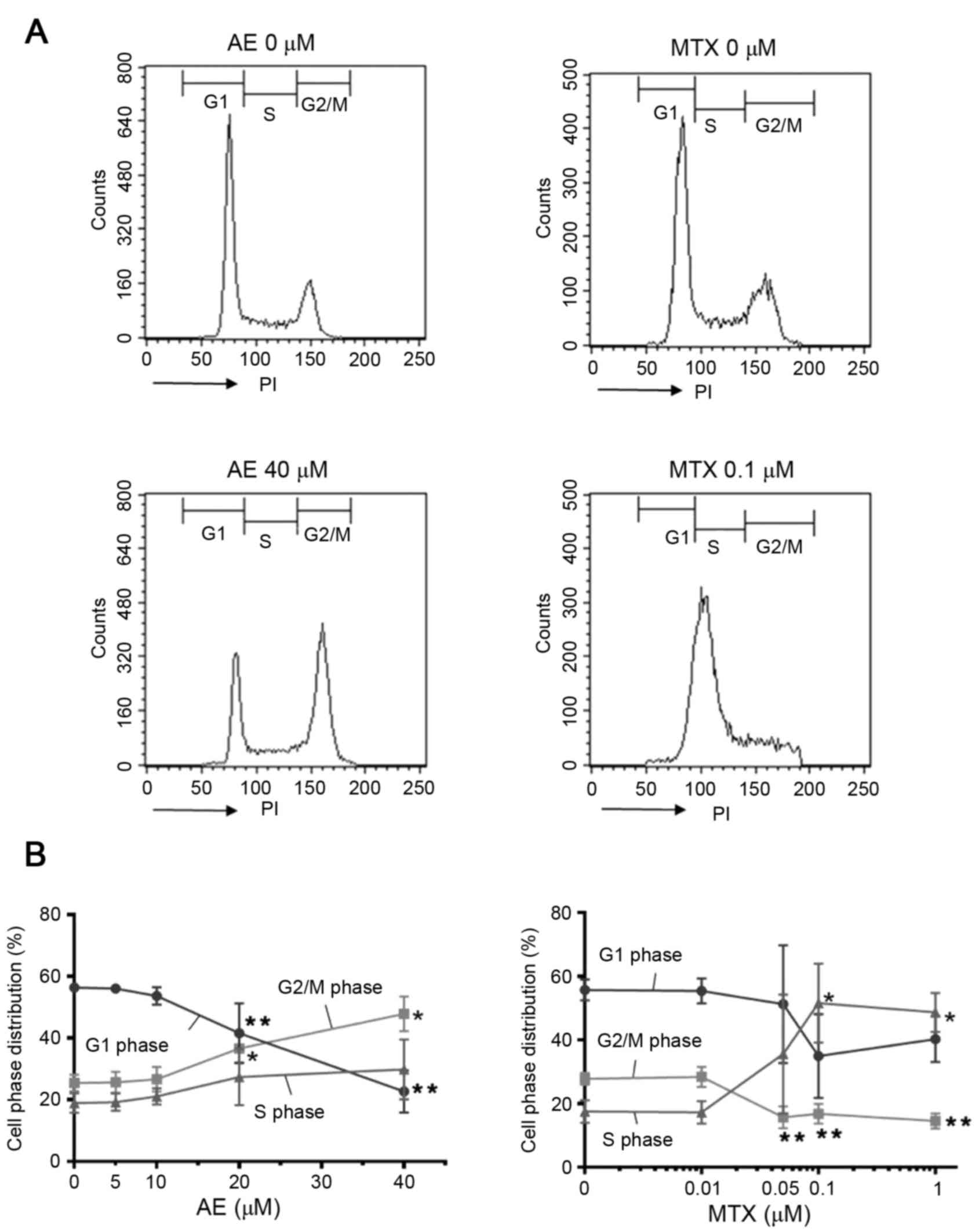|
1
|
Müller-Ladner U, Pap T, Gay RE, Neidhart M
and Gay S: Mechanisms of disease: The molecular and cellular basis
of joint destruction in rheumatoid arthritis. Nat Clin Pract
Rheumatol. 1:102–110. 2005. View Article : Google Scholar
|
|
2
|
Nishioka K, Hasunuma T, Kato T, Sumida T
and Kobata T: Apoptosis in rheumatoid arthritis: A novel pathway in
the regulation of synovial tissue. Arthritis Rheum. 41:1–9. 1998.
View Article : Google Scholar
|
|
3
|
Pope RM: Apoptosis as a therapeutic tool
in rheumatoid arthritis. Nat Rev Immunol. 2:527–535. 2002.
View Article : Google Scholar
|
|
4
|
Bartok B and Firestein GS: Fibroblast-like
synoviocytes: Key effector cells in rheumatoid arthritis. Immunol
Rev. 233:233–255. 2010. View Article : Google Scholar :
|
|
5
|
Arend WP and Dayer JM: Cytokines and
cytokine inhibitors or antagonists in rheumatoid arthritis.
Arthritis Rheum. 33:305–315. 1990. View Article : Google Scholar
|
|
6
|
Meyer FA, Yaron I, Mashiah V and Yaron M:
Methotrexate inhibits proliferation but not interleukin-1
stimulated secretory activities of cultured human synovial
fibroblasts. J Rheumatol. 20:238–242. 1993.
|
|
7
|
Firestein GS, Nguyen K, Aupperle KR, Yeo
M, Boyle DL and Zvaifler NJ: Apoptosis in rheumatoid arthritis: p53
overexpression in rheumatoid arthritis synovium. Am J Pathol.
149:2143–2151. 1996.
|
|
8
|
Firestein GS, Echeverri F, Yeo M, Zvaifler
NJ and Green DR: Somatic mutations in the p53 tumor suppressor gene
in rheumatoid arthritis synovium. Proc Natl Acad Sci USA. 94:pp.
10895–10900. 1997; View Article : Google Scholar :
|
|
9
|
Cutolo M, Sulli A, Pizzorni C, Seriolo B
and Straub RH: Anti-inflammatory mechanisms of methotrexate in
rheumatoid arthritis. Ann Rheum Dis. 60:729–735. 2001. View Article : Google Scholar :
|
|
10
|
Park MY, Kwon HJ and Sung MK: Evaluation
of aloin and aloe-emodin as anti-inflammatory agents in aloe by
using murine macrophages. Biosci Biotechnol Biochem. 73:828–832.
2009. View Article : Google Scholar
|
|
11
|
Hu B, Zhang H, Meng X, Wang F and Wang P:
Aloe-emodin from rhubarb (Rheum rhabarbarum) inhibits
lipopolysaccharide-induced inflammatory responses in RAW264.7
macrophages. J Ethnopharmacol. 153:846–853. 2014. View Article : Google Scholar
|
|
12
|
Pecere T, Gazzola MV, Mucignat C, Parolin
C, Vecchia FD, Cavaggioni A, Basso G, Diaspro A, Salvato B, Carli M
and Palù G: Aloe-emodin is a new type of anticancer agent with
selective activity against neuroectodermal tumors. Cancer Res.
60:2800–2804. 2000.
|
|
13
|
Kuo PL, Lin TC and Lin CC: The
antiproliferative activity of aloe-emodin is through p53-dependent
and p21-dependent apoptotic pathway in human hepatoma cell lines.
Life Sci. 71:1879–1892. 2002. View Article : Google Scholar
|
|
14
|
Chen HC, Hsieh WT, Chang WC and Chung JG:
Aloe-emodin induced in vitro G2/M arrest of cell cycle in human
promyelocytic leukemia HL-60 cells. Food Chem Toxicol.
42:1251–1257. 2004. View Article : Google Scholar
|
|
15
|
Chiu TH, Lai WW, Hsia TC, Yang JS, Lai TY,
Wu PP, Ma CY, Yeh CC, Ho CC, Lu HF, et al: Aloe-emodin induces cell
death through S-phase arrest and caspase-dependent pathways in
human tongue squamous cancer SCC-4 cells. Anticancer Res.
29:4503–4511. 2009.
|
|
16
|
Suboj P, Babykutty S, Srinivas P and
Gopala S: Aloe emodin induces G2/M cell cycle arrest and apoptosis
via activation of caspase-6 in human colon cancer cells.
Pharmacology. 89:91–98. 2012. View Article : Google Scholar
|
|
17
|
Chen R, Zhang J, Hu Y, Wang S, Chen M and
Wang Y: Potential antineoplastic effects of aloe-emodin: A
comprehensive review. Am J Chin Med. 42:275–288. 2014. View Article : Google Scholar
|
|
18
|
Miyazawa K, Mori A and Okudaira H:
Establishment and characterization of a novel human rheumatoid
fibroblast-like synoviocyte line, MH7A, immortalized with SV40 T
antigen. J Biochem. 124:1153–1162. 1998. View Article : Google Scholar
|
|
19
|
Cronstein BN: Low-dose methotrexate: A
mainstay in the treatment of rheumatoid arthritis. Pharmacol Rev.
57:163–172. 2005. View Article : Google Scholar
|
|
20
|
Kremer JM: Major side effects of low-dose
methotrexateUpToDate. Ravinder NM: UpToDate, Inc.; Waltham, MA:
2014
|
|
21
|
Herman CJ, Allen P, Hunt WC, Prasad A and
Brady TJ: Use of complementary therapies among primary care clinic
patients with arthritis. Prev Chronic Dis. 1:A122004.
|
|
22
|
Ernst E: Herbal medicine in the treatment
of rheumatic diseases. Rheum Dis Clin North Am. 37:95–102. 2011.
View Article : Google Scholar
|
|
23
|
Lin ML, Lu YC, Su HL, Lin HT, Lee CC, Kang
SE, Lai TC, Chung JG and Chen SS: Destabilization of CARP mRNAs by
aloe-emodin contributes to caspase-8-mediated p53-independent
apoptosis of human carcinoma cells. J Cell Biochem. 112:1176–1191.
2011. View Article : Google Scholar
|
|
24
|
Lee HZ, Hsu SL, Liu MC and Wu CH: Effects
and mechanisms of aloe-emodin on cell death in human lung squamous
cell carcinoma. Eur J Pharmacol. 431:287–295. 2001. View Article : Google Scholar
|
|
25
|
Tishler M, Caspi D, Graff E, Segal R,
Peretz H and Yaron M: Synovial and serum levels of methotrexate
during methotrexate therapy of rheumatoid arthritis. Br J
Rheumatol. 28:422–423. 1989. View Article : Google Scholar
|
|
26
|
Nakazawa F, Matsuno H, Yudoh K, Katayama
R, Sawai T, Uzuki M and Kimura T: Methotrexate inhibits rheumatoid
synovitis by inducing apoptosis. J Rheumatol. 28:1800–1808.
2001.
|
|
27
|
Pucci B, Kasten M and Giordano A: Cell
cycle and apoptosis. Neoplasia. 2:291–299. 2000. View Article : Google Scholar :
|















